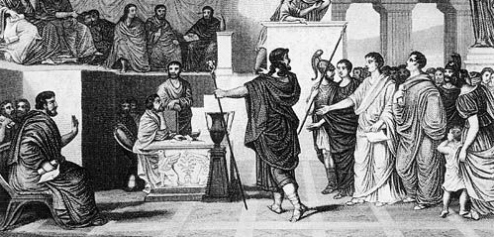The phrase "source of law" is used in a number of different senses which will be found discussed in works on Jurisprudence. In the sense in which it is used here it means a method by which new rules of law can come into existence. The corresponding sources at Rome during the republic were: Lex and plebiscitum, interpretatio, edicta magistratuum and custom.
- Lex and plebiscitum
Lex was strictly an enactment of the comitia, either the centuriata or the tributa (1), while plebiscitum was one passed by the concilium plebis. As soon, however, as its enactments had been put on a level with those of the comitia, the concilium plebis became the usual organ of legislation, and laws passed by it were frequently called leges. This practice indeed was so common, even among lawyers, that it can hardly be called incorrect.
Apart from the XII Tables themselves, which were of course a lex, statute was not a very fruitful source of law during the republic. Roman legislation, like our own, was usually of a political character and the development of private law was, in the main, left to the other sources, especially interpretation and magisterial edict. There were, however, a number of leges (or plebiscita) of constitutional importante which affected private law and some which, so far as we know, had no political significance. Chief among the latter class is the lex Aquilia, which recast the whole law of damage to property, and was the basis of all subsequent law on this subject. Among laws which were the result of political struggles we can mention the lex Canuleia of 445 B.C., which removed the prohibition of intermarriage between patricians and plebeians that had still been kept in the XII Tables, and the lex Poetelia (? 326 B.C.), which mitigated the severity of the law of debt. A political character also probably attached to the various statues dealing with suretyship discussed by Gaius (2).
A distinction is drawn by Ulpian between three different degrees of "perfection" which may attach to a law.
A lex perfecta is one which forbids an act and declares the act invalid if done; a lex minus quam perfecta is one which does not declare the forbidden act invalid but imposes a penalty on the person doing the act; a lex imperfecta is one which forbids an act but neither declares it invalid if done nor imposes a penalty.
An example of the last class is the lex Cincia (204 B.C.), which forbade gifts above a certain amount except among near relatives, but neither invalidated them nor punished the offender (3).
The lex Furia testamentaria, on the other hand, is a lex minus quam perfecta. It forbade legacies of more than 1000 asses except to certain persons, but did not invalidate them; instead it gave an action for a fourfold penalty against the person who had received such a legacy.
What reason there can have been for passing leges imperfectae is unknown; it is suggested that the form comes from that adopted for plebiscita at a time when these had not yet obtained the force of law, and consequently could not either invalidate a transaction which was otherwise valid or impose penalties, but there is no evidence to show that this conjecture is right.
At the end of some leges there was a paragraph called sanctio, which laid down penalties for contravention of the law, but whether we are to imagine that all laws normally contained such a paragraph and that leges imperfectae were characterised by its absence is unknown.
----------
(1) The curiata had ceased to have any political importance in republican times.
(2) Other important leges are the lex Aebutia introducing the formulary procedure, the lex Plaetoria protecting minors against fraud, leges Atilia and Iulia et Titia concerning tutela, and leges Furia, Voconia, Falcidia dealing with legacies, and lex Cincia restricting gifts.
(3) It must not, however, be supposed that the law was without effects; the praetor enforced it, within limits, by exceptio and replicatio.
----------
- Sources of law in the republic
+ Interpretatio
+ Edicta magistratuum
+ Custom
----------
Source:
Historical introduction to the study of Roman law, H. F. Jolowicz, pages 83 - 85.
